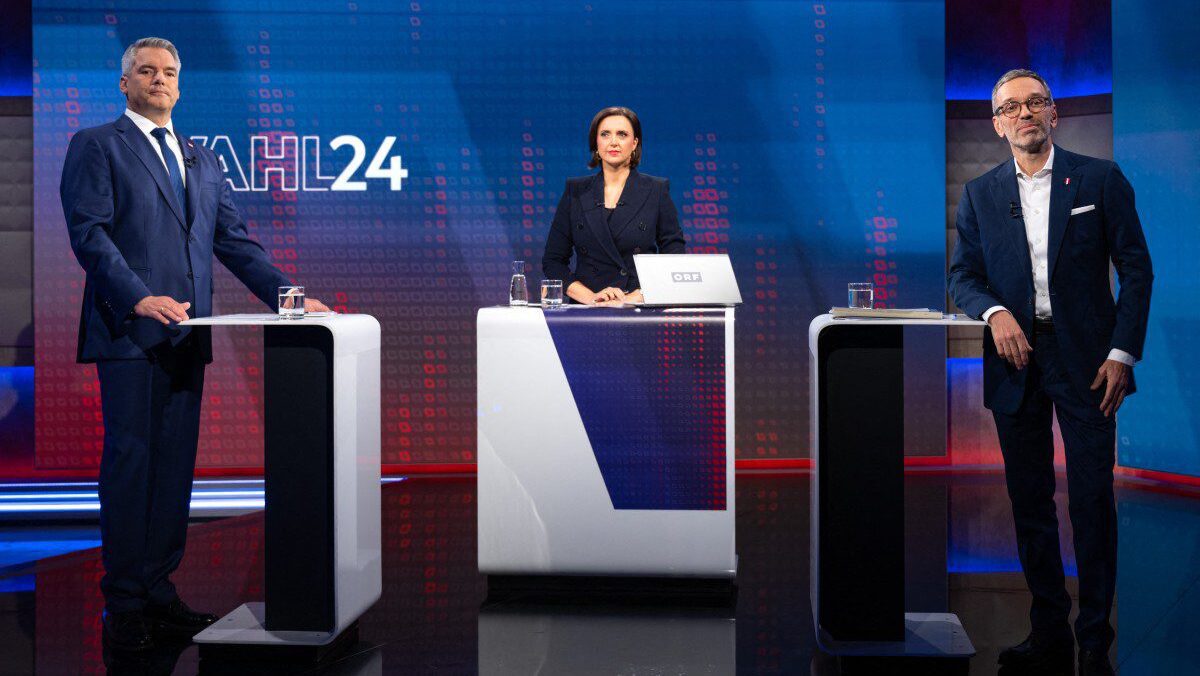
Austrian Chancellor and Head of the Austrian People’s Party (ÖVP) Karl Nehammer (L) and chairman and top candidate of the Freedom Party of Austria (FPÖ) Herbert Kickl (R) meet during their pre-election tv debate hosted by journalist Susanne Schnabl of Austrian state network ORF in Vienna, Austria on September 23, 2024.
Photo: Joe Klamar / AFP
The leaders of the two most popular parties in Austria accused each other of being too radical in an attempt to convince voters of their own trustworthiness just a few days before the Central European country holds its national elections on September 29th.
Chancellor Karl Nehammer, leader of the centre-right People’s Party (ÖVP), and Herbert Kickl, leader of the opposition right-wing Freedom Party (FPÖ) confronted each other in a live debate on the ORF public broadcaster on Monday night in what was the last TV debate before the elections.
Their duel was highly anticipated, as FPÖ continues to lead opinion polls (27%) and ÖVP is following closely behind (25%). The two discussed the most heated topics, including migration, the economy, the war in Ukraine, and the ÖVP-Green government’s handling of the COVID crisis.
Austria, IFDD poll:
— Europe Elects (@EuropeElects) September 24, 2024
FPÖ-PfE: 27%
ÖVP-EPP: 25%
SPÖ-S&D: 21% (+1)
NEOS-RE: 9%
GRÜNE-G/EFA: 9% (+1)
BIER-*: 3% (-2)
KPÖ-LEFT: 3%
+/- vs. 2-6 September 2024
Fieldwork: 19-22 September 2024
Sample size: 1,000
➤ https://t.co/XWpToewZ7C pic.twitter.com/wLIAYhBH3h
Herbert Kickl accused the government and Karl Nehammer—who was the interior minister in the first two years of the government and took over the role of chancellor later on—of trying to turn the country “from a normal state, a democratic one, into a totalitarian state of emergency” with the lockdown measures at the time of the pandemic. Among the decisions taken by the government, he cited the compulsory vaccination of all adults—a decision which was later revoked.
Nehammer retorted by saying that his government took responsibility for its actions, even though they “made mistakes,” and accused the FPÖ of trying to spread fear and using the crisis for political gain. He also accused Kickl of spreading conspiracy theories, including calling the World Health Organisation the future world government, and the World Economic Forum in Davos the precursor to world domination.
ÖVP-Nehammer hat sich während Corona komplett radikalisiert! pic.twitter.com/ihEwzuQSI9
— FPÖ (@FPOE_TV) September 24, 2024
The chancellor credited his government with lowering the number of asylum seekers and illegal border crossings, citing a 97% drop at the border between Austria and Hungary, thanks to more effective border controls and police cooperation with the Hungarian authorities. Nehammer talked of the need to reduce the pressure at the external borders of the European Union and to strike deals with North African countries so that asylum procedures can be outsourced.
Migration has been a hot topic in the campaign, and while the number of asylum seekers in Austria has decreased from 112,000 in 2022 to 59,000 last year, FPÖ has been reminding its voters that 240,000 illegal immigrants have come to Austria since the current government took power in 2020.
The Freedom Party has been campaigning with the concept of ‘Fortress Austria,’ meaning the party, if elected to government, would immediately suspend asylum applications, put in place a real border protection system, enable pushbacks, and consistently deport failed asylum seekers. “The crucial point is that we bring about a total reversal in the way we think and act when it comes to asylum,” Herbert Kickl said during the debate.
He called the EU’s Migration Pact a “sham,” saying it does not secure the external borders and does not enable pushbacks, but instead serves as a pull factor for migrants, because they know that once they step on European soil, they will be dispersed among the member states.
According to an assessment by the daily Die Presse, apart from a few issues, the general tone of the debate was “calm, authoritative, factual. It was a conversation, not an argument.” Both party leaders criticised the EU and the ÖVP’s coalition partners the Greens.
Despite seemingly many similarities between the two parties (who governed together in 2017-19), Nehammer has ruled out forming a coalition with the FPÖ, and so have all the other forces, which makes a government headed by the ÖVP, featuring the Social Democrats, as well as a third coalition partner all the more likely.
Opinion polls place the Social Democrats at 21%, the Greens at 9%, and the liberal NEOS party also at 9%.
